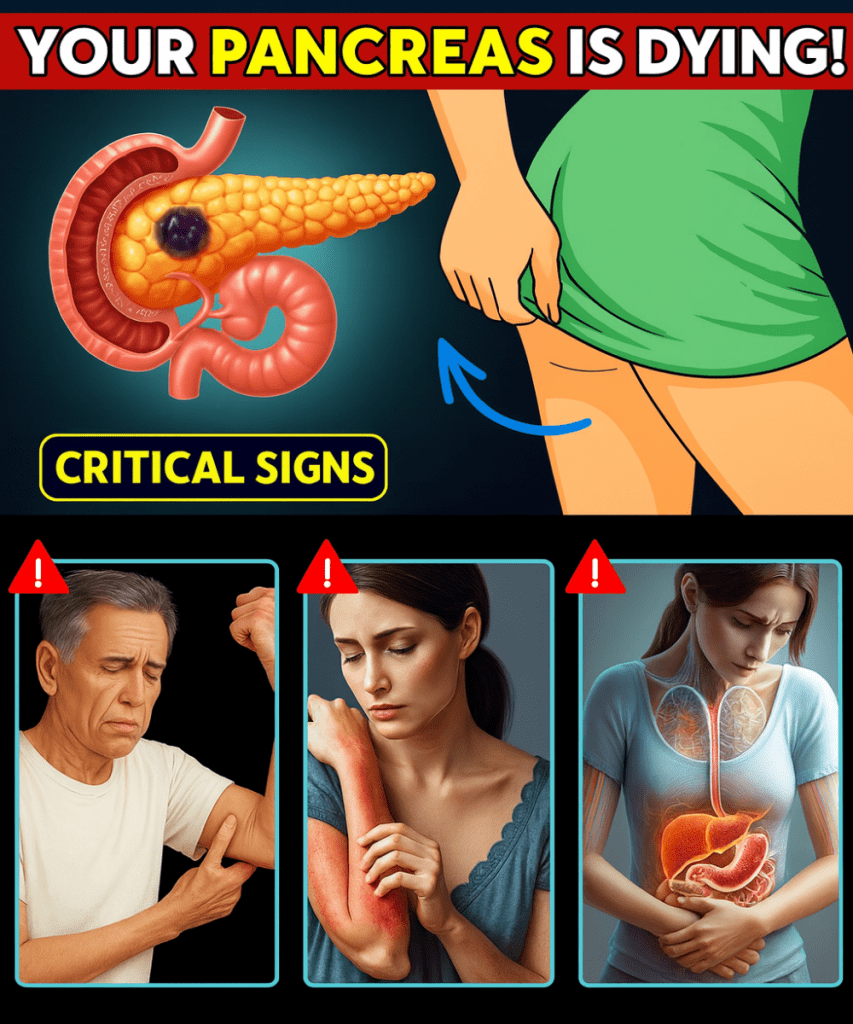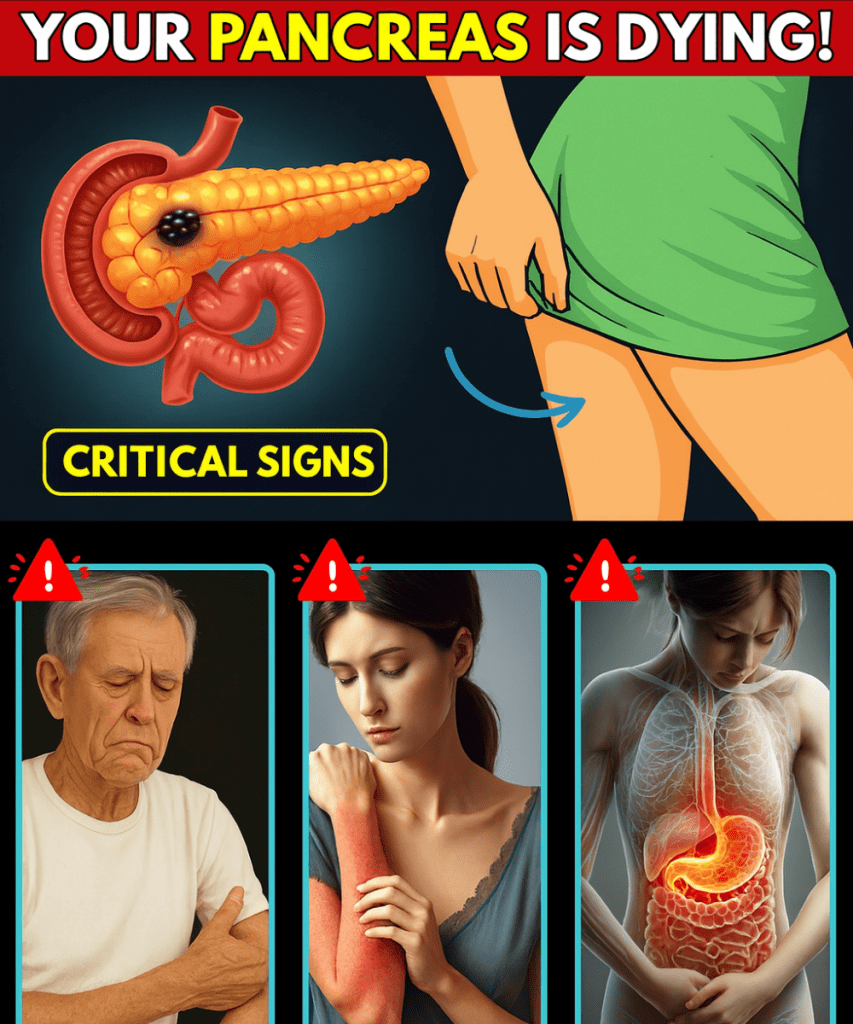What if the subtle signals your body is sending are warning you of a silent, deadly disease? Pancreatic cancer, often dubbed the “silent killer,” is notorious for its vague symptoms that can easily be mistaken for everyday ailments. By the time most people notice something’s wrong, the disease may have already progressed, making early detection a critical factor in improving survival rates. The good news? Being aware of the early warning signs can empower you to act swiftly and potentially save your life.
In this article, we uncover eight shocking symptoms of pancreatic cancer that demand your attention. From unexplained weight loss to persistent pain, these signs could be your body’s way of sounding the alarm. Don’t brush them off—read on to learn what to watch for and why acting quickly could make all the difference.

🌟 Why Pancreatic Cancer Is So Hard to Catch Early
The pancreas, a small organ tucked deep behind your stomach, plays a vital role in digestion and blood sugar regulation. But its hidden location makes it difficult to detect issues until they’ve advanced. Pancreatic cancer often grows silently, with symptoms that mimic common conditions like indigestion or stress. According to the American Cancer Society, only about 11.5% of people diagnosed with pancreatic cancer survive five years or more, largely because it’s rarely caught early.
Recognizing the warning signs is your first line of defense. While these symptoms don’t always mean cancer, persistent or worsening issues should prompt a visit to your doctor. Let’s dive into the eight signs you should never ignore.
⚠️ 1. Unexplained Weight Loss: A Red Flag You Can’t Dismiss
Losing weight without trying might sound like a dream, but it’s often a serious warning sign. Up to 85% of pancreatic cancer patients experience unexplained weight loss by the time of diagnosis. This happens because pancreatic tumors can disrupt the organ’s ability to produce digestive enzymes, leading to malabsorption of nutrients. Cancer cells also consume significant energy, causing muscle and fat breakdown.
If you’ve lost 5–10 pounds or more in a few months without changes in diet or exercise, especially alongside other symptoms, it’s time to see a doctor. This persistent, unintended weight loss is a key indicator that something may be wrong.
😖 2. Persistent Abdominal or Back Pain: A Deep, Nagging Ache
A dull, persistent pain in your upper abdomen that radiates to your back could signal pancreatic cancer. Unlike typical stomachaches, this pain often worsens after eating or when lying down and may feel like it’s “boring” through to your spine. Tumors in the pancreas can press on nearby organs or nerves, causing this distinctive discomfort.
According to Johns Hopkins Medicine, this pain is often constant and not relieved by over-the-counter medications or position changes. If you notice a nagging ache in your upper abdomen or mid-back that lingers for weeks, don’t dismiss it as just a pulled muscle—get it checked.
🟡 3. Jaundice: When Your Skin and Eyes Turn Yellow
Jaundice, marked by yellowing of the skin and whites of the eyes, is a hallmark sign of pancreatic cancer, especially for tumors in the head of the pancreas. This occurs when a tumor blocks the bile duct, causing bilirubin (a liver waste product) to build up in the bloodstream. You may also notice dark urine, pale or clay-colored stools, and itchy skin due to this blockage.
The American Cancer Society notes that jaundice can appear early, even before other symptoms, making it a critical clue. If you see these changes, especially without a known liver issue, seek medical attention immediately. Early recognition could lead to a diagnosis when the cancer is more treatable.
🤢 4. Digestive Issues: When Your Gut Feels Off
Pancreatic cancer can disrupt the pancreas’s ability to produce digestive enzymes, leading to a range of gut-related symptoms. These may include:
- Nausea and Vomiting: Tumors pressing on the stomach can cause queasiness or vomiting, especially after meals.
- Bloating or Early Fullness: Feeling full after small meals (early satiety) or experiencing bloating may indicate a tumor affecting digestion.
- Greasy, Floating Stools: Known as steatorrhea, these pale, oily, foul-smelling stools result from fat malabsorption when pancreatic enzymes are blocked.
If these digestive issues persist for more than a week or two, particularly with other symptoms, consult a healthcare provider to rule out serious conditions.
🩺 5. New-Onset Diabetes: A Surprising Clue
A sudden diagnosis of diabetes in adulthood, especially without risk factors like obesity or family history, can be an early warning sign of pancreatic cancer. The pancreas produces insulin, and a tumor can impair this function, leading to high blood sugar. The American Diabetes Association notes that up to 40% of pancreatic cancer patients are diagnosed with diabetes in the months before their cancer diagnosis.
Symptoms like increased thirst, frequent urination, or unexplained fatigue may accompany this new-onset diabetes. If your blood sugar suddenly spikes or becomes hard to control, discuss it with your doctor—it could be a clue to an underlying pancreatic issue.
🩸 6. Blood Clots: An Unexpected Warning
Pancreatic cancer can increase the risk of blood clots, such as deep vein thrombosis (DVT) in the legs or pulmonary embolism (PE) in the lungs. These clots may cause pain, swelling, redness, or warmth in the affected area, or even chest pain and shortness of breath if a clot travels to the lungs.
While blood clots have many causes, unexplained clots in older adults without other risk factors warrant further investigation. If you experience these symptoms, seek medical care immediately, as clots can be life-threatening.
😴 7. Fatigue and Weakness: More Than Just Tiredness
Feeling exhausted despite getting enough rest? Pancreatic cancer can cause persistent fatigue and physical weakness due to the body’s fight against the disease or poor nutrient absorption. This isn’t the occasional tiredness from a busy day—it’s a deep, lingering exhaustion that doesn’t improve with sleep.
If you’re experiencing ongoing fatigue alongside other symptoms like weight loss or digestive issues, it’s a sign to consult your doctor. This vague symptom is easy to dismiss but could be part of a bigger picture.
👐 8. Itchy Skin: An Overlooked but Telling Sign
Persistent itching, especially on the palms and soles, can be a surprising symptom of pancreatic cancer. When a tumor blocks the bile duct, bilirubin builds up in the skin, irritating nerve endings and causing intense itching without a rash. This symptom often accompanies jaundice but may appear earlier, making it a critical clue.
If you’re scratching constantly without an obvious cause like allergies or dry skin, especially with other symptoms, don’t ignore it—see a healthcare provider promptly.

🩺 When to See a Doctor: Don’t Wait for Answers
These symptoms don’t always mean pancreatic cancer—many are caused by less serious conditions like gallstones, infections, or irritable bowel syndrome. However, if you experience a combination of these signs, particularly if they persist for more than a week or two, it’s crucial to seek medical advice. Early detection can significantly improve treatment outcomes, as pancreatic cancer is most treatable in its early stages.
Your doctor may recommend blood tests, imaging (like CT scans or MRIs), or a biopsy to investigate. If you have risk factors like a family history of pancreatic cancer, smoking, obesity, or chronic pancreatitis, be especially vigilant.
🌿 Lifestyle and Risk Reduction: Take Control
While some risk factors for pancreatic cancer, like genetics, are beyond your control, lifestyle changes can lower your risk:
- Quit Smoking: Smoking is a major risk factor, and quitting can significantly reduce your chances of developing pancreatic cancer.
- Maintain a Healthy Weight: Obesity is linked to higher risk, so aim for a balanced diet and regular exercise.
- Limit Alcohol: Excessive alcohol can lead to chronic pancreatitis, a risk factor for pancreatic cancer.
- Monitor Blood Sugar: Managing diabetes or prediabetes can support pancreatic health.
Regular checkups and discussing your family history with a genetic counselor can also help identify your risk early.
💡 Why Awareness Is Your Best Defense
Pancreatic cancer’s stealthy nature makes it a formidable foe, but knowledge is power. By recognizing these eight warning signs—unexplained weight loss, persistent pain, jaundice, digestive issues, new-onset diabetes, blood clots, fatigue, and itchy skin—you can take charge of your health. Don’t let vague symptoms fool you into complacency; your body’s signals are worth listening to.
If you or a loved one are experiencing these symptoms, act now. Schedule a doctor’s visit, ask questions, and advocate for thorough testing. Early detection could be the key to a better outcome. Have you noticed any of these signs or made lifestyle changes to reduce your risk? Share your story below to inspire others to stay vigilant! 🌟









